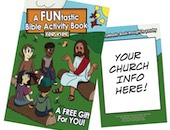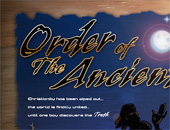Movie Review: Harry Potter and the Order of the Phoenix
Membership Level› Guest
Author/Source: Henry Zonio
Topic: Movie Review
A review of Harry Potter and the Order of the Phoenix including a description of the movie, areas of concern, teachable themes, discussion questions, and scriptures to use.
Overview
In this fifth installment of the Harry Potter movies, Harry Potter and the Order of the Phoenix, we are introduced to a 15-year old Harry (Daniel Radcliffe) sitting in the park confronted by Dudley (Harry Melling), his cousin, and Dudley's bully gang. All of a sudden the sky goes dark and Harry and Dudley are running through some tunnels to get home. Everything goes cold as both Harry and Dudley are attacked by Dementors, evil creatures who can suck a person's soul from their body. Luckily Harry has battled with these creatures before and knows how to ward them off.
WARNING: SPOILERS AHEAD!
Click to skip spoilers
Upon returning home, Harry receives a letter from the Ministry of Magic stating that he has been expelled from Hogwarts School of Witchcraft and Wizardry for underage use of magic outside of school in front of Muggles (non-magic people). That evening Harry is whisked away from home to his godfather's home where Harry finds out that Professor Dumbledore (Michael Gambon) has reconvened a group of people who were formed 14 years prior to battle Lord Voldemort (Ralph Fiennes) and his followers called Death Eaters. Dumbledore's group is called "The Order of the Phoenix". Harry also finds out that in spite of the death of an Hogwarts student the previous year at the hands of Lord Voldemort, the Ministry of Magic is denying that the Dark Lord has returned from his assumed death and has been at work using a publicity campaign to discount Harry and Dumbledore's claims that He-Who-Must-Not-Be-Named has returned.
After being exonerated of charges of misuse of magic, Harry returns to Hogwarts along with friends Ron (Rupert Grint) and Hermoine (Emma Watson). At school, they find that there is yet another Defense Against the Dark Arts professor -- Delores Umbridge (Imelda Staunton). Umbridge, undersecretary to the Minister of Magic, is more concerned about students passing their standardized tests than about preparing them for the impending danger of Lord Voldemort's return. She denies any claim that Voldemort has returned and proceeds on a systematic takeover of Hogwarts by becoming "High Inquisitor" of the school and enacting numerous rules which harshly limit the freedoms of the students.
Some of the students, led by Harry, proceed to meet secretly and learn defensive magic to protect themselves when the Dark Lord decides to begin his war and take over the world. The students call themselves Dumbledore's Army as a sarcastic response to the Minister of Magic believing that Dumbledore is starting rumors about Voldemort returning in order to take over the position of Minister of Magic. Eventually, the students are discovered by Umbridge, and Dumbledore is accused of amassing an army. Dumbledore leaves before he can be arrested and Umbridge becomes headmaster of Hogwarts.
All while this is happening, Harry has been having visions of a room in the ministry of magic. After he has a vision of Arthur Weasley (Mark Williams), Ron's father, being attacked by a snake and it is found out to be true, Dumbledore suspects that there is a link between Voldemort and Harry in which Voldemort might be able to control Harry. After failed lessons with Professor Snape (Alan Rickman) to safeguard Harry against an attack on Harry's mind, Harry has a vision that his godfather is being tortured by Voldemort at the Ministry of Magic.
Harry and his friends arrive at the Ministry to find that Harry had been tricked so that Voldemort could get his hands on a prophesy that involved Harry and himself. After a battle between the Death Eaters and the Order of the Phoenix, where Harry's godfather Sirius Black (Gary Oldman) dies and the prophesy is destroyed, Harry is confronted by Voldemort. Dumbledore shows up, and there is a battle between these two powerful wizards. At one point, Voldemort uses his connection with Harry to try and kill Harry. Harry fights back and defeats Voldemort by showing sympathy for Voldemort because Voldemort has no one who loves him.
As Voldemort leaves the Ministry of Magic, members of the Ministry, including Minister of Magic, Cornelius Fudge (Robert Hardy), see that Voldemort really is alive and back. The movie ends with Dumbledore being restored as headmaster and Fudge resigning as Minister of Magic. Harry and his friends return home realizing that there is a war ahead of them.
END OF SPOILERS
Concerns
As always with the Harry Potter series, there is a debate on whether the magic used in these stories is simply part of the genre of fantasy literature or if the magic in these stories constitutes actual witchcraft that is spoken against in the Bible. I think that this controversy has been discussed enough since the first book came out 10 years ago. For more discussion on this you can view previous threads on Kidology or elsewhere. Another good source to be better informed on this controversy is the book What's a Christian to Do With Harry Potter by Connie Neal.
This movie definitely reflects an older Harry and a much darker world because of the return of Voldemort. Battle scenes are a bit more intense and the movie is darker than the others. Younger children may find the movie more frightening than the previous ones.
Much of the movie surrounds the tension between Professor Umbridge's rules and regulations and the students concerns that they are being lied to and put in danger's way by not being prepared for the seemingly inevitable war that Voldemort is going to start. A large group of students meets secretly, in blatant opposition to the rules, in order to learn defensive magic. Children may be confused at what constitutes legitimate and illegitimate forms of civil disobedience.
Teachable Themes
- Civil Disobedience
The bulk of this movie deals with the irrational rules and regulations put forth by Professor Umbridge by the power of the Ministry of Magic in order to color the reality that Voldemort has returned and how the students respond. Harry and his friends decide that they are being put in danger's way if they follow the rules and don't learn how to protect themselves from evil spells and attacks so they decide to break the rules and form a secret group that meets to learn defensive magic. Unlike the other movies and books, this form of disobedience is more than just teenage rebellion. The students are faced with obeying the rules and living in denial of the danger they are in or being proactive and preparing to defend themselves from the evil that they do end up facing.
This would be a good opportunity to take a look at historical figures who performed acts of civil disobedience, beginning with the founders of the United States through those who fought against slavery, those who pioneered civil rights, and up to the modern day of people who face injustice in different parts of the world. You can even bring up people like Corrie ten Boom and Dietrich Bonhoeffer and other Christians who commit or have committed acts of civil disobedience. - Importance of Community/Family
Over and over again, Harry is reminded that he is not alone in his fight against Voldemort. Each time Harry tries to do things on his own, his friends insist on joining him. Near the end of the movie, when Harry is battling for his mind with Voldemort, he realizes that one of the strengths he has over Voldemort is the love of his friends and mentors, which Voldemort lacks.
Biblical References
- Civil Disobedience:
- Mark 2:23-28 - "One Sabbath Jesus was going through the grainfields, and as his disciples walked along, they began to pick some heads of grain. The Pharisees said to him, 'Look, why are they doing what is unlawful on the Sabbath?'
He answered, 'Have you never read what David did when he and his companions were hungry and in need? In the days of Abiathar the high priest, he entered the house of God and ate the consecrated bread, which is lawful only for priests to eat. And he also gave some to his companions.'
Then he said to them, 'The Sabbath was made for man, not man for the Sabbath. So the Son of Man is Lord even of the Sabbath.'" (NIV) - Mark 3:1-6 - "Another time he went into the synagogue, and a man with a shriveled hand was there. Some of them were looking for a reason to accuse Jesus, so they watched him closely to see if he would heal him on the Sabbath. Jesus said to the man with the shriveled hand, 'Stand up in front of everyone.'
Then Jesus asked them, 'Which is lawful on the Sabbath: to do good or to do evil, to save life or to kill?' But they remained silent.
He looked around at them in anger and, deeply distressed at their stubborn hearts, said to the man, 'Stretch out your hand.' He stretched it out, and his hand was completely restored. Then the Pharisees went out and began to plot with the Herodians how they might kill Jesus." - Luke 13:10-17 - "On a Sabbath Jesus was teaching in one of the synagogues, and a woman was there who had been crippled by a spirit for eighteen years. She was bent over and could not straighten up at all. When Jesus saw her, he called her forward and said to her, 'Woman, you are set free from your infirmity.' Then he put his hands on her, and immediately she straightened up and praised God.
Indignant because Jesus had healed on the Sabbath, the synagogue ruler said to the people, 'There are six days for work. So come and be healed on those days, not on the Sabbath.'
The Lord answered him, 'You hypocrites! Doesn't each of you on the Sabbath untie his ox or donkey from the stall and lead it out to give it water? Then should not this woman, a daughter of Abraham, whom Satan has kept bound for eighteen long years, be set free on the Sabbath day from what bound her?'
When he said this, all his opponents were humiliated, but the people were delighted with all the wonderful things he was doing."
I know these scriptures don't explicitly talk about civil disobedience, but they are but a few examples of Jesus committing acts of civil disobedience that might be beneficial in bringing up this topic with children. - Mark 2:23-28 - "One Sabbath Jesus was going through the grainfields, and as his disciples walked along, they began to pick some heads of grain. The Pharisees said to him, 'Look, why are they doing what is unlawful on the Sabbath?'
- Importance of Community/Family:
- Ecclesiastes 4:8-12 - "There was a man all alone; he had neither son nor brother. There was no end to his toil, yet his eyes were not content with his wealth. 'For whom am I toiling,' he asked, 'and why am I depriving myself of enjoyment?' This too is meaningless—a miserable business!
Two are better than one, because they have a good return for their work:
If one falls down, his friend can help him up. But pity the man who falls and has no one to help him up!
Also, if two lie down together, they will keep warm. But how can one keep warm alone?
Though one may be overpowered, two can defend themselves. A cord of three strands is not quickly broken."
- Ecclesiastes 4:8-12 - "There was a man all alone; he had neither son nor brother. There was no end to his toil, yet his eyes were not content with his wealth. 'For whom am I toiling,' he asked, 'and why am I depriving myself of enjoyment?' This too is meaningless—a miserable business!
Discussion Questions
- Civil Disobedience:
- Is it ever OK to disobey authority? If so, when is it OK?
- Why did Jesus go against some of the rules that the religious leaders had made?
- Think of some people you've learned about in history who disobeyed the law because they thought the law was wrong? Why was it OK for each of those people to do that?
- Who is the ultimate authority on what is right and wrong?
- Importance of Community/Family:
- Think of a time when you had to do something on your own. What did it feel like? Would it have been better to do it with a couple of friends or your family? Why?
- Why is it easier/more enjoyable to do things with other people?
- Think of someone you might know who might be lonely or not have friends or family. What is one way you can be a friend to that person and help them to not be alone?











